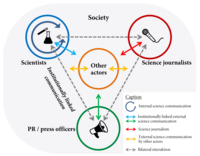
Everyday science learning and equity: Mapping the contested terrain
Sign Up to like & getrecommendations! Published in 2017 at "Science Education"
DOI: 10.1002/sce.21286
Abstract: Out-of-school settings promise to broaden participation in science to groups that are often left out of school-based opportunities (National Research Council [NRC], 2009). Increasing such involvement is premised on the notion that science is intricately… read more here.
Keywords: equity; everyday science; science; science learning ... See more keywords

Wonder as a tool to engage preservice elementary teachers in science learning and teaching
Sign Up to like & getrecommendations! Published in 2017 at "Science Education"
DOI: 10.1002/sce.21300
Abstract: This exploratory project considers the use of wonder as a pedagogical tool with preservice elementary teachers (PSETs). An ongoing vexation facing science teacher educators is helping future elementary teachers overcome anxiety and negative associations with… read more here.
Keywords: science; science learning; tool; preservice elementary ... See more keywords

An Investigation of Taiwanese High School Students’ Basic Psychological Need Satisfaction and Frustration in Science Learning Contexts in Relation to Their Science Learning Self-Efficacy
Sign Up to like & getrecommendations! Published in 2019 at "International Journal of Science and Mathematics Education"
DOI: 10.1007/s10763-019-09950-x
Abstract: The purpose of the current research was to develop an instrument for high school students aiming to explore the satisfaction and frustration of their basic psychological needs of autonomy, relatedness, and competence while learning science… read more here.
Keywords: science; psychological needs; satisfaction; science learning ... See more keywords

Relationship among High School Students’ Science Academic Hardiness, Conceptions of Learning Science and Science Learning Self-Efficacy in Singapore
Sign Up to like & getrecommendations! Published in 2020 at "International Journal of Science and Mathematics Education"
DOI: 10.1007/s10763-019-10040-1
Abstract: This study used three previously validated instruments, namely Science Academic Hardiness (SAH), Students’ Conceptions of Learning Science (COLS) and Science Learning Self-Efficacy (SLSE) on 431 Singaporean students. Using structural equation modeling, results showed that the… read more here.
Keywords: learning science; science; learning self; science learning ... See more keywords

Mobile Devices and Apps as Scaffolds to Science Learning in the Primary Classroom
Sign Up to like & getrecommendations! Published in 2017 at "Journal of Science Education and Technology"
DOI: 10.1007/s10956-017-9702-4
Abstract: Considerable work over many years has explored the contribution technology can make to science learning, at all levels of education. In the school sector, historically this has focused on the use of fixed, desktop-based or… read more here.
Keywords: mobile devices; scaffolds science; science; science learning ... See more keywords

Science learning and teaching in a Creole-speaking environment
Sign Up to like & getrecommendations! Published in 2017 at "Cultural Studies of Science Education"
DOI: 10.1007/s11422-016-9760-6
Abstract: The focus of this response to Charity Hudley and Christine Mallinson’s article, ‘“Its worth our time”: A model of culturally and linguistically responsive professional development for K-12 STEM educators’, is to underpin a pedagogy that… read more here.
Keywords: learning teaching; science; science learning; speaking environment ... See more keywords

Profiles of adolescents’ motivational beliefs in science learning and science achievement in 26 countries: Results from TIMSS 2011 data
Sign Up to like & getrecommendations! Published in 2017 at "International Journal of Educational Research"
DOI: 10.1016/j.ijer.2016.11.006
Abstract: Abstract The study aims to investigate the relations between three adolescent motivational beliefs in science learning and science achievement within an international scope. Drawing on the expectancy-value theory, the expectancy and task value beliefs have… read more here.
Keywords: motivational beliefs; science; science learning; beliefs science ... See more keywords

The influence of books' textual features and caregivers' extratextual talk on children's science learning in the context of shared book reading.
Sign Up to like & getrecommendations! Published in 2022 at "Developmental psychology"
DOI: 10.1037/dev0001480
Abstract: During early childhood, reading books with one's caregiver (shared book reading) is a valuable means of supporting learning. Yet, there are gaps in our understanding of the influence of shared book reading on young children's… read more here.
Keywords: book reading; talk; science learning; shared book ... See more keywords

Socially mediated metacognition for understanding science of learning in medical education
Sign Up to like & getrecommendations! Published in 2017 at "Medical Teacher"
DOI: 10.1080/0142159x.2017.1302577
Abstract: I write in response to Gooding et al.’s (2017) article on twelve tips for applying science of learning in medical education. The importance of metacognition commonly understood as awareness of one’s thinking accompanied by self-regulatory… read more here.
Keywords: medical education; science learning; socially mediated; learning medical ... See more keywords

Effects of different student response modes on science learning
Sign Up to like & getrecommendations! Published in 2017 at "Interactive Learning Environments"
DOI: 10.1080/10494820.2016.1242080
Abstract: ABSTRACT Student response systems (SRSs) are wireless answering devices that enable students to provide simple real-time feedback to instructors. This study aims to evaluate the effects of different SRS interaction modes on elementary school students’… read more here.
Keywords: science; science learning; modes science; student response ... See more keywords

Findings and implications of flipped science learning research: A review of journal publications
Sign Up to like & getrecommendations! Published in 2019 at "Interactive Learning Environments"
DOI: 10.1080/10494820.2019.1690528
Abstract: ABSTRACTWith reference to the Technology-based Learning model for flipped classrooms, a literature review on Social Sciences Citation Index (SSCI) papers published in the Web of Science (WOS) datab... read more here.
Keywords: findings implications; science; science learning; learning research ... See more keywords